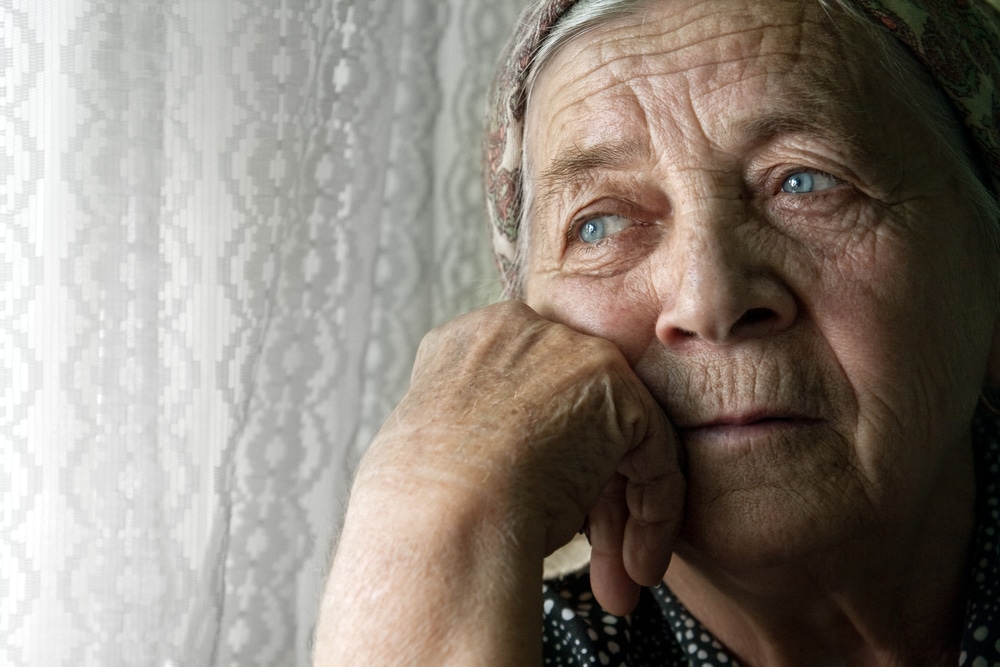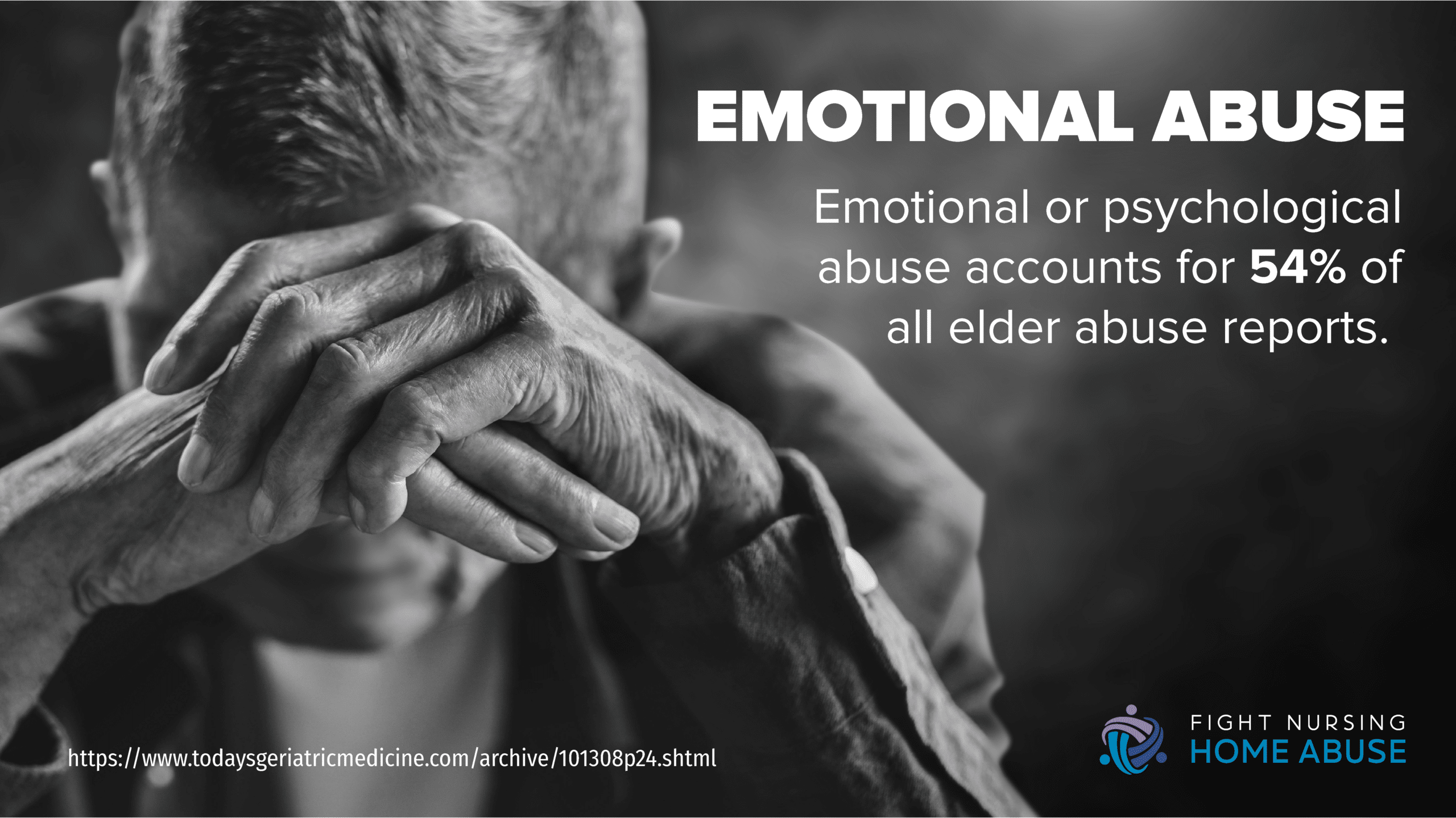Emotional Abuse

Emotional abuse is all too common in nursing homes and, sadly, may continue for months or even years before discovery. Without the physical scars and bruising from physical abuse, it is much more difficult to identify and stop. This is especially true when the victims have dementia or cognitive impairments which may prevent them from accurately reporting the abuse.
If your loved one is the victim of nursing home abuse, you may be eligible to pursue damages. Let us review your case for free. We can help you seek justice for you and/or your family member. Call us today at 1-866-548-9636 to get started.
Understanding Emotional Abuse in Nursing Homes
According to the Centers for Disease Control and Prevention (CDC), emotional abuse of a senior occurs when a caregiver’s behavior results in:
- Anguish
- Mental pain
- Fear
- Distress
In general, emotional abuse often succeeds in making a resident feel:
- Humiliated
- Threatened
- Isolated
- Controlled
Some typical examples of emotional or psychological abuse include:
- Name calling, insults, or mocking
- Isolating from family and friends
- Refusal to allow access to the telephone or other means of communication
- Yelling
- Humiliating or shaming
- Talking about a resident in a demeaning way to others
- Threatening physical or sexual abuse
- Ignoring the resident’s concerns
- Refusing to allow the resident to participate in social activities
- Ignoring requests for assistance
- Giving them the “cold shoulder”
- Taking away walkers, canes, glasses, or other important items

Spotting Emotional Nursing Home Abuse
Seniors who rely on others for their care and well-being are among the most vulnerable populations in the United States. If you do not serve as an advocate for your loved one who lives in a long-term care facility, no one else will. For this reason, it is imperative you understand the signs of a senior who is suffering emotional or psychological abuse. Such signs may include:
Reports of Abuse
If your aging loved one reports abuse, bullying, or other bad behavior, take their report seriously and investigate what is going on. While seniors with cognitive impairments are not always the most trustworthy reporters, it is important to investigate.
Withdrawal
When a usually chipper and outgoing senior begins to withdraw, there is a medical or psychological reason why. If they are only emotionally withdrawn with a particular caregiver, this could point toward the abuser.
Losing Interest in Favorite Activities
If your beloved senior loses interest in their favorite activities, you should look into why. Depression is a common culprit, but this can also be a sign of emotional abuse.
Unexplained Emotions
If your loved one seems to be upset regularly but you cannot identify another reason why, emotional abuse could trigger a host of unexplained emotions such as crying, fear, anxiety and agitation.
New Soothing Behaviors
Seniors who have Alzheimer’s disease and other cognitive medical conditions may attempt to soothe themselves with new and unusual behaviors. Examples include mumbling, rocking, rubbing and other similar behaviors.
Take Action to Pursue Justice for Your Aging Family Member
Emotional abuse in nursing homes is difficult to identify and even harder to prove. However, it is vital that you act to stop the abuser and the system that allows this type of abuse to continue. Have a nursing home abuse lawyer review the circumstances of your loved one’s abuse, identify the liable parties and take legal action on behalf of your family.
At Nursing Home Abuse Center, we can ensure your loved one’s rights remain protected and their safety and wellbeing remain at the forefront. With a nursing home abuse and neglect lawyer on your side, you can expect us to:
- Investigate the case, including documenting evidence and interviewing witnesses
- Follow proper protocol to interview nursing home administrators and others involved
- Working with any necessary expert witnesses
- Prepare a strong case to pursue compensation and get the justice your loved one deserves
- Attempt to negotiate an out-of-court settlement if appropriate and possible
- File a civil suit and argue for your loved one’s best interests in court
Damages Available in a Nursing Home Emotional Abuse Case
Emotional abuse leaves fewer physical scars on victims, but the psychological scars can be devastating. Every case is different, and some seniors may recover quickly once the abuse stops. Others need help coping with the emotional pain or dealing with what happened to them.
The recoverable damages in an emotional abuse case vary widely depending on your loved one’s actual needs, as well as their expenses and losses. Some of the most common damages include:
- Any necessary medical care related to the abuse
- Psychological therapy and treatment
- Out-of-pocket costs
- Reimbursement of financial losses
- Pain and suffering
- Mental anguish
Wrongful Death Actions
While it is unlikely emotional abuse alone would cause your aging loved one to pass away, a combination of neglect or physical abuse and psychological abuse could lead to the death of a loved one. If your loved one died in a nursing home, you might be able to file a wrongful death claim and pursue damages.
Get Legal Help to Combat Emotional Abuse in Nursing Homes
If your loved one is the victim of nursing home abuse and neglect, having an attorney on your side is a great way to pursue justice and compensation on their behalf. A lawyer will protect your loved one’s rights while fighting for the dignity and the quality of life they deserve.
Let Nursing Home Abuse Center help you pursue compensation and justice for your loved one. Get help today by calling 1-866-548-9636.


